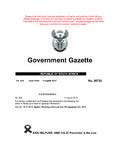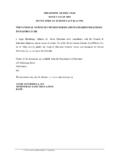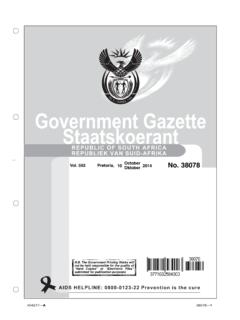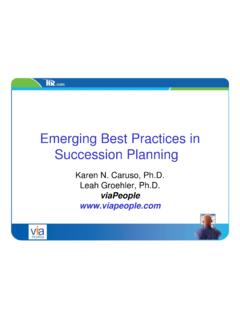Transcription of Competencies and Standards Generation for the …
1 11-Mar-15 1 1 Competencies and Standards Generation for the Planning Profession 2 11-Mar-15 2 3 Subject Part 1: Consolidated Report Consolidated report contents Summary of findings Path from an occupation to a profession Part 2: Competencies , Standards , registration, job profiling Context, linkages and golden thread for registration Competencies and Standards Registration guidelines Job profiling SACPLAN contact details Index to Presentation Part 1: Consolidated Report 4 11-Mar-15 3 Consolidated report contents 5 1: Background SACPLAN Project 2009 to 2012: Existing Knowledge: Status Quo Report. Proposed Competencies for Planners. Standards , Processes and Procedures for Planners. Terms of Reference compiled by SACPLAN for the 2013 Project. Objectives and tasks included in the 2013 SACPLAN Project: Report on Gaps in Existing Knowledge. Consolidated Report.
2 Executive Summary. Guideline Document of Competencies and Standards . PPT presentation explaining the guidelines. Guideline Document for Registration Criteria. Job profiling Document. 6 11-Mar-15 4 2: Project deliverables Project consists of: Guidelines for curriculum development. Guidelines for registration. Frameworks that will inform the Occupation Specific Dispensation (OSD) as well as the Organising Framework of Occupations (OFO) Identification and development of legislative amendments to the PPA (2002); Regulations and Rules. Development of Accreditation Criteria for planning programmes and schools. Development of a Continuous Professional Development (CPD) policy and procedure. Development of an Examination System(s) as part of the Registration Process. Qualification in SAQA format. 7 3: Consolidated Report: Section 1 Integration and consolidation of the existing knowledge: Status quo and analysis.
3 Generation of the Competencies with NQF levels. Credits and Standards . Inputs by Stakeholders were provided and considered. Specific input: Occupation Specific Dispensation (OSD) (DPSA); job specification processes and National Capacity Coordinating and Monitoring Committee (NMCCMC) to be considered. Address definitions and basic terminology. Reports (output) to be subject to extended process of stakeholder participation (Workshops) 8 11-Mar-15 5 4: Consolidated Report: Section 2 Section 2 of the Consolidated Status Quo Report includes the following topics: Policy and legal framework guiding planning. Higher educational bodies, arrangements, definitions of terms and policies. Definition of key terms and implications for planning profession. History and background to developing Competencies and Standards . Contextualising the Planning Profession in South Africa.
4 Supply and demand for planners. Competencies and Standards : international experience. Other professional bodies in South Africa and their development of Competencies and Standards . Conclusion of findings included in the Status Quo Report. 9 Summary of findings 10 11-Mar-15 6 5: Summary of findings General observations related to Competencies and Standards : Attempts in defining Competencies in the past have been characterised by difficulties and problems. Recent work did not address the issue to define outcomes for each level of academic qualification and work experience. Attempts to date are not aligned to SAQA and NEQF requirements. Such attempts do not represent a clear or seamless interface between Competencies , accreditation and registration. Lack of vision, description of the role of Planners and work description in terms of the profession's domain.
5 11 General observations related to Competencies and Standards (continued): Lack reciprocal agreements with foreign institutes and professional bodies. Absence of a benchmark professional examination as part of the registration process. Need for introduction of CPD centred on individual, professional development and excellence. Need to introduce Work Reservation. 5: Summary of findings (continued) 12 11-Mar-15 7 5: Summary of findings (continued) Observations related to international planning institutions and local professional bodies: An important consideration was to draw on international as well as local experience of other professions in developing Competencies and Standards (inclusive of processes of accreditation; professional registration; CPD and RPL principles and practice) Lessons learnt from international practices and approaches in Canada; Australia; United Kingdom; and India (limited).
6 Lessons learnt from ECSA; PLATO; and SACAP. General points of departure related to the SACPLAN Project 2013: The need and requirement for accreditation with clear Competencies set out. The need for professional registration is basic to all professions. Setting of minimum level of professional competence and Standards . Recognition of alternative routes into profession. Requirements of SAQA and HEQF to be complied with. 13 5: Summary of findings (continued) Observations related to Continued Professional Development (CPD): Recent development amongst professions. CPD is instituted in terms of laws and Codes of Conduct and is mandatory to uphold professional registration. System of earning credits (learning units) for CPD activities over a specific cycle. CPD output to be reported to Professional Body. Observations related to Generation of Competencies : Formulation of Competencies and Standards must be viewed as a 'package' inclusive of: accreditation Standards ; academic requirements; practical work; registration routes; recognition of RPL in registration; categories of professional registration; application of registration criteria; SAQA and HEQF requirements; guidelines for international reciprocity; Competencies and job profiling to support Planning Profession; clear vision of planning work and what planners do and identification of specific planning work.
7 14 11-Mar-15 8 6: Consolidated Report: value and way forward The Consolidated Report serves as an overarching source document that needs to be updated on a regular basis. Before we move onto the detail of the Competencies and Standards report, lets look at the reality of the past in order to understand where we are moving to in the future. Figure 1 on the Urban and Regional Planning growth and development path from occupation to profession . 15 Path from an occupation to a profession 16 11-Mar-15 9 17 Fig. 1 Part 2: Competencies , Standards , Registration, Job profiling 18 11-Mar-15 10 Context, linkages and golden thread for registration 19 1: Context, role and purpose SACPLAN has a mandate re Competencies & Standards . Assisting in development of an enabling document for SACPLAN to oversee a process. The Guidelines on Competencies set broad boundaries within which university programmes can be accredited in line with international practices and local needs/realities.
8 Will present the principles underpinning Competencies , Registration and Job profiling . Seek input and support from identified stakeholders on these principles. 20 11-Mar-15 11 Linkages and golden thread in registration path for planners 21 2: Guidelines for Competencies and Standards for Curricula Development Outline: - Competencies expected of Planners based on qualifications - Standards and Competencies for planning educators - Accreditation process Internationally and in South Africa, Competencies form the basis for curricula design, for accreditation of qualifications, registration and job profiling . Working document and the basis for inputs from key stakeholders. Process for finalising draft report involves a workshop with SACPLAN Steering Committee (3 December 2013) + revisions workshop with CHoPS (23 & 24 January 2014) + revisions workshop with other Key Stakeholders (13 February to 6 March 2014) Final input by all stakeholders: 14 March, 2014 Final revisions to all reports after close out workshop with SSC.
9 22 11-Mar-15 12 3: Use of Competencies and Standards Guidelines Educational institutions to design their curricula for planning qualifications; SACPLAN to accredit and monitor these qualifications; SACPLAN to monitor the qualifications and experience of Planning Educators on these degree/diploma programmes; Unregistered Planners to determine what additional credits or qualifications they need; and Employers for job profiling . 23 4: Building blocks for formulation of Competencies Definition of Planning: Evolution of interpretation of planning in SA. PPA definition (2002) Contemporary international practice. SACPLAN s motto. Definition adapted to South African context (next slide) Basis for formulating Competencies and distinguishing a planner s Competencies in contrast to professionals working in built and natural environment and development fields.
10 Guiding Principles formulated by SACPLAN. Code of Conduct. Contextual factors: Development challenges. Institutional context. 24 11-Mar-15 13 5: Context of planning The core of urban and regional planning is a concern with people and how they use space: Where and under what conditions people live How people make their livelihoods How people move between their homes and other destinations How and under what conditions land is used. These concerns are manifested as spatial systems and networks. Planning is a strategic, rather than a comprehensive activity, which implies selectivity and a focus on what really makes a difference to the fortunes of an area over time. Planning is a field of expertise which involves initiating and managing change in the built and natural environment, across a spectrum of contexts, ranging from urban to rural; and delineated at different geographic scales (national, regional, sub-regional, city, town, village, neighbourhood), in order to further human development and environmental sustainability.









